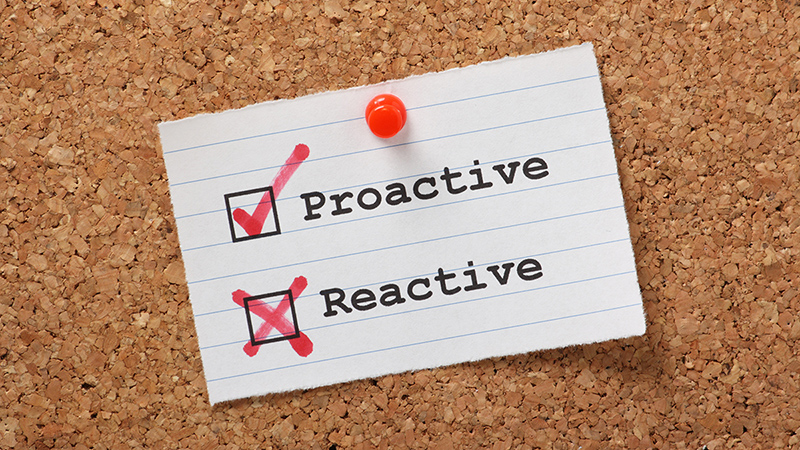It seems to me that the most common management style is to put out fires as they appear. This is a reactive style, which is not, in my opinion, the best way to succeed.
Is Your Legal Strategy Reactive or Proactive – Or Maybe Even Creative?

A reactive style creates a vicious cycle of hurry, inefficiency and stress. Little or no time is left for development, leadership and innovation. A manager of this style cannot be a great leader. One who cannot manage oneself can never successfully manage others.
A second, far better style is a proactive style. Here the manager has learned the skill of managing him- or herself. Instead of constantly being in fire drill mode, he or she prepares and plans for the future.
A proactive manager plans how to prevent fires and then executes that plan so that not even the slightest smoke can form. This strategy leaves plenty of space for leadership, development and innovation.
Have you ever wondered why some of the best business leaders’ desks are empty? It is because of their choice, practice and execution of proactive management strategy.
Luck or Skill?
These same main styles of management are directly applicable to legal strategy in modern corporations. It is my experience that many companies could do much better in this area.
Let me elaborate through an imagery contractual situation:
A company, Reactive Ltd, enters into a long term agreement with a supplier, Proactive Ltd.
Reactive does not have a legal strategy. It negotiates the agreement without legal consultation, because it wants to get things done without legal hassle.
At some point, problems arise in the contractual relationship. Reactive tries to solve the problems as they appear. All of the sudden, the problems escalate and Proactive sues Reactive. Now Reactive approaches an attorney.
The supplier in this contractual relationship, Proactive Ltd, has a proactive legal strategy. It keeps its attorney up to date on the contract negotiations and receives constant feedback. The agreement is legally solid on the Proactive’s side.
When the problems arise, Proactive consults its attorneys immediately. The attorneys see the possibility for future conflict and give Proactive specific advice on what kind of correspondence should be executed to manage the risks in advance.
When things escalate, Proactive terminates the agreement and takes legal action.
Which one you think has the stronger hand, the purchaser, Reactive, or the supplier, Proactive?
I have litigated on both sides. Let me tell you, the war has most often been won before battle has even been joined.
It is exactly as Sun Tzu wrote: ‘victorious warriors win first and then go to war’. Winning with a reactive strategy is luck. Winning with a proactive strategy is skill.

Lawyer Are a Bit Like Doctors
The legal profession is much like the medical profession. We, the lawyers, analyse the symptoms (facts and problems) and provide the treatment. As in the medical profession, in the field of law, patients most often seek help far too late.
In that situation, the options for and effectiveness of the treatment are much more limited. Sometimes the illness has already reached the terminal stage before help is sought. Some preventive health care would certainly have been more helpful.
If you had time to read this far, that proves that you are proactive yourself. Why don’t you also take a couple of minutes to think about your legal strategy rather than putting it off until later?
PS. Oh yeah, I almost forgot, there is a third type of strategy, a creative one. Even though society is packed with norms, there is always room for legal innovation. As a client, you should demand more, push us lawyers to the limits. Tell us your goals and make us innovate. This is a creative strategy, but only few master it.















